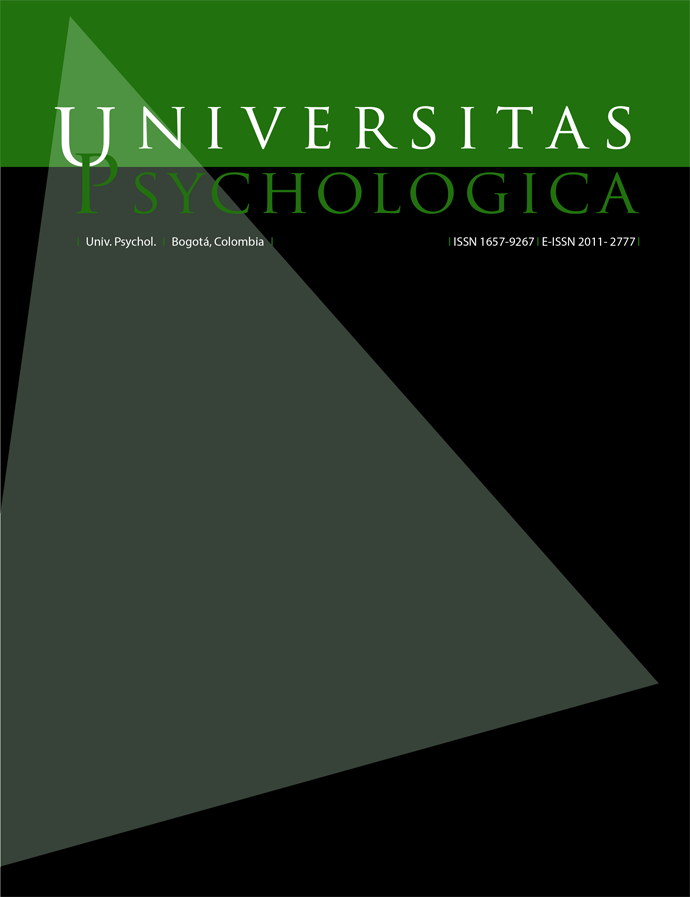Resumen
Authors response to the Critic review: Mizael, T. M., & de Almeida, J. H. (2022). The complexity of racial prejudice: The importance of a broader perspective. Universitas Psychologica, 21, 1-4. https://doi.org/10.11144/Javeriana.upsy21.tcrp
Barnes-Holmes, D., Murphy, A., Barnes-Holmes, Y., & Stewart, I. (2010). The Implicit Relational Assessment Procedure: Exploring the impact of private versus public contexts and the response latency criterion on pro-white and anti-black stereotyping among white Irish individuals. The Psychological Record, 60, 57-79. https://doi.org/10.1007/BF03395694
Barnes-Holmes, D., Finn, M., McEnteggart, C., & Barnes-Holmes, Y. (2018). Derived stimulus relations and their role in a behavior-analytic account of human language and cognition. Perspectives on Behavior Science, 4, 155-173. https://doi.org/10.1007/s40614-017-0124-7
Finn, M., Barnes-Holmes, D., & McEnteggart, C. (2018). Exploring the single-trial-type-dominance-effect in the IRAP: Developing a differential arbitrarily applicable relational responding effects (DAARRE) model. The Psychological Record, 68(1), 11-25. https://doi.org/10.1007/s40732-017-0262-z
Hughes, S., & Barnes-Holmes, D. (2013). A functional approach to the study of implicit cognition: The Implicit Relational Assessment Procedure (IRAP) and the Relational Elaboration Coherence (REC) model. In S. Dymond & B. Roche (Eds.), Advances in Relational Frame Theory: Research and application (pp. 97-125). New Harbinger Publications.
LeJeune, J., & Luoma, J. B. (2019). Values in therapy: A clinician's guide to helping clients explore values, increase psychological flexibility, and live a more meaningful life. New Harbinger Publications.
Lillis, J., & Hayes, S. C. (2007). Applying acceptance, mindfulness, and values to the reduction of prejudice: A pilot study. Behavior Modification, 31, 389-411. https://doi.org/10.1177/0145445506298413
Matsuda, K., Garcia, Y., Catagnus, R., & Brandt, J. A. (2020). Can behavior analysis help us understand and reduce racism? A review of the current literature. Behavior Analysis in Practice, 13(2), 336-347. https://doi.org/10.1007/s40617-020-00411-4
Mizael, T. M., & de Almeida, J. H. (2019). Revisão de estudos do implicit relational assessment procedure sobre vieses raciais. Acta Comportamentalia: Revista Latina de Análisis de Comportamiento, 27, 437-461. https://doi.org/10.5380/psi.v20i2.46278
Mizael, T. M., & de Almeida, J. H. (2022). The complexity of racial prejudice: The importance of a broader perspective. Universitas Psychologica, 21, 1-4. https://doi.org/10.11144/Javeriana.upsy21.tcrp
Spreng, R. N., McKinnon, M. C., Mar, R. A., & Levine, B. (2009). The Toronto Empathy Questionnaire: Scale development and initial validation of a factor-analytic solution to multiple empathy measures. Journal of Personality Assessment, 91, 62-71. https://doi.org/10.1016/j.jcbs.2014.06.001
Stoddard, J. A., & Afari, N. (2014). The Big Book of ACT Metaphors: A practitioner’s guide to experiential exercises and metaphors in Acceptance and Commitment Therapy. New Harbinger Publications.
Todd, A., R., Bodenhausen, G. V., Richeson, J. A., & Galinsky, A. D. (2011). Perspective taking combats automatic expressions of racial bias. Journal of Personality and Social Psychology, 100, 1027-1042. https://doi.org/10.1016/j.jesp.2011.12.011
Vahey, N. A., Nicholson, E., & Barnes-Holmes, D. (2015). A meta-analysis of criterion effects for the Implicit Relational Assessment Procedure (IRAP) in the clinical domain. Journal of Behavior Therapy and Experimental Psychiatry, 48, 59-65. https://doi.org/10.1016/j.jbtep.2015.01.004

Esta obra está bajo una licencia internacional Creative Commons Atribución 4.0.
Derechos de autor 2025 Carmen Beck, Yors Garcia Olaya



